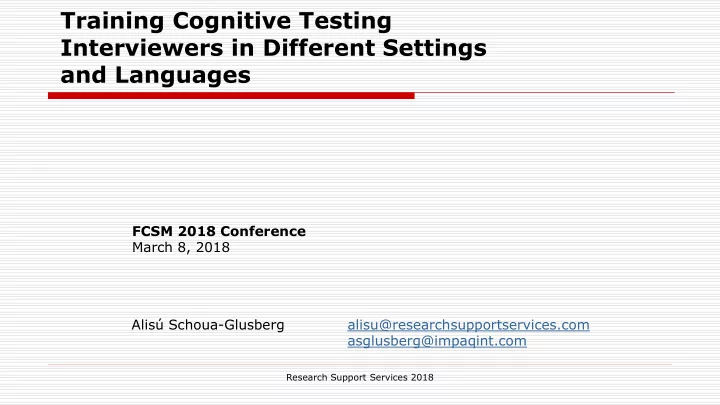

Training Cognitive Testing Interviewers in Different Settings and Languages FCSM 2018 Conference March 8, 2018 Alisú Schoua-Glusberg alisu@researchsupportservices.com asglusberg@impaqint.com Research Support Services 2018
Outline Asking comparable questions How cognitive testing can help Cognitive testing of translaitons What to do in places with no experience of cognitive testing Recruiting and training cognitive interviewers Training contents Major obstacles Minimum standards Some examples from around the worls Lessons learned Research Support Services 2018 2
Instrument Design and Cognitive Testing Comparative cross-national surveys often require asking ▪ questions of samples that speak different languages Research within one country can also include speakers of ▪ different languages (and cultures) For multilingual/multicultural studies, instrument design ▪ typically occurs in English with limited consideration of cultural realities in target populations Translation and cognitive testing of the instrument are ▪ the steps that follow instrument design in English Research Support Services 2018 3
Asking Comparable Questions Comparability cannot just be assumed Needs to be actively pursued through careful research design and assessed by gathering evidence Cognitive testing of translations is one way to assess: how questions will work in the target language(s), what types of errors are present in each language version, and whether questions perform comparably across language versions. Research Support Services 2018 4
How Cognitive Testing Can Help Cognitive testing will also: provide information about the causes of problems in • question performance that can guide recommendations and point to potential remedies. For this reason, failing to conduct cognitive testing • in multilingual settings means that the fielded question may not perform in the new language version(s) as intended . Research Support Services 2018 5
Best Practice in Comparative Research Cognitive testing in English Translation via Best Practice Methods (TRAPD Model implemented in Team/Committee Translation) in country Cognitive testing in target language Compare findings across languages Modify original survey instrument to smooth out differences Update translations Research Support Services 2018 6
Cognitive Testing of Translations: what do we test for? Comprehension : are questions understood as intended? Equivalence : do questions work as intended? Do low education respondents understand the translation ? Are there cultural issues in interpreting the questions or giving responses? Are there alternative translations that might work better? Does the style seem right in the interaction of the interview? Research Support Services 2018 7
Challenging Situations No trained local researchers available Language barriers Translation Realities of budget and timeline Research Support Services 2018 8
Importance of Staff Selection In the absence of experienced qualitative interviewers need to remember … Cognitive interviewing is more than following an interview guide Skills needed are both linguistic and qualitative research skills Research Support Services 2018 9
Difference in Skill Set QUALITATIVE INTERVIEWERS SURVEY INTERVIEWERS ◼ Gaining cooperation ◼ No persuasion skills needed ◼ Reading as worded ◼ Good listening skills ◼ Minimal probing to help ◼ Analytic skills to know when elicit codeable answers need to probe further Research Support Services 2018 10
Contents of Training What is cognitive testing? Minimal theoretical background Purpose of cognitive testing of instrument Research Ethics (consent, privacy, data security) Protocol review Practice/feedback, practice/feedback, practice/feedback, more practice/more feedback Research Support Services 2018 11
When Reality Hits Not enough time/budget for best practice in most projects Translations often on the fly or done without methodological safeguards Cognitive testing in language by minimally trained interviewers Findings reviewed very quickly and superficially Changes must be done too fast Difficult QC in field and without language command Research Support Services 2018 12
Some Real Life Examples Costa Rica: quantitative researcher, trained in advance, native speaker, together with local partner Ecuador: Experienced qualitative researcher, native speaker India / Malawi / Rwanda: experienced qualitative researcher trained, observed, and debriefed local partner Chile: experienced qualitative researcher trained and observed quantitative researchers Liberia: Experienced qualitative interviewers trained via remote webinar. Researcher in person led practice and debriefs Laos: Remote skype training of quant interviewers Research Support Services 2018 13
Cultural Sensitivity Checklist for Instruments Is anything in the questions or the style of asking that might be poorly received or even offensive. Do any questions sound strange for the study population context. Would any questions be difficult for the study population to answer. Why. Are any questions NOT likely to elicit a full answer. If so, why. Are there questions that may not yield usable information or collect the intended information Are any questions uncomfortable for interviewers to ask. Is the introduction/consent/explanation of purpose of the interview presented in the best order for the local discourse style. Research Support Services 2018 14
Lessons Learned Ideal procedures are often not possible You must decide what are your minimum standards must of quality in cognitive testing and adhere to them Training often must be done remotely Language barriers make this difficult Use a native/local researcher as co-researcher Observe and debrief/Practice/Observe and debrief Research Support Services 2018 15
Thank you for your attention! Questions? alisu@researchsupportservices.com Research Support Services 2018 16
Recommend
More recommend